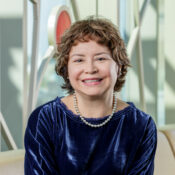Day Two Welcome
Day 2: November 15, 2023 | 8:30 a.m. – 9:00 a.m., Varsity Hall
Session Video
Session Description
Chief Diversity Officer LaVar J. Charleston and Provost Charles Lee Isbell Jr. welcome attendees to day two of the Diversity Forum conference. Oneida Nation of WI Professor, School of Human Ecology, Carolee Dodge Francis will provide the Native Nations Tribute.
Speakers
LaVar J. Charleston
LaVar J. Charleston, Ph.D., is the deputy vice chancellor for diversity & inclusion at UW–Madison. He serves as vice provost and chief diversity officer for the university as well as the Elzie Higginbottom director of the Division of Diversity, Equity & Educational Achievement (DDEEA).
Dr. Charleston provides overall leadership for the university’s efforts to create a diverse, equitable and inclusive learning and working environment for all students, faculty, staff, alumni and others who work with the university. Along with the staff of the DDEEA, he partners with leadership in the university’s schools, colleges and divisions, as well as shared governance groups, to create policies that promote equity and social justice while fostering a sense of belonging for all members of the UW community. Dr. Charleston oversees the administration of scholarship and service programs designed to increase diversity and foster equity and inclusion for students, faculty and staff at the university. A first-generation college graduate and Badger alumnus from Detroit, Dr. Charleston earned his master’s and doctoral degrees from the UW–Madison School of Education in 2007 and 2010.
Carolee Dodge Francis
Dr. Carolee Dodge Francis is a Native American (Oneida Nation) social behavioral researcher, Chair, Department of Civil Society & Community Studies and Ecology of Human Well-Being Professor at the School of Human Ecology, UW – Madison. She strives to intertwine community engagement and research scholarship as a reflection of her cultural understanding within a contemporary context focusing upon the well-being of Indigenous populations. Dr. Dodge Francis has over 30+ years’ work experience ranging from public health/community wellness, Indigenous evaluation & program development, to qualitative community-based participatory research within urban and rural Native American communities. She is a published author and has been a Principal Investigator with federal (NIH and CDC) funding sources for well over a decade.
Charles Lee Isbell Jr.
Charles Lee Isbell, Jr. began serving as UW-Madison’s provost and vice chancellor for academic affairs in August of 2023, succeeding J. Karl Scholz, who served as provost from 2019-2023. Prior to his appointment at UW-Madison, Isbell served as the dean and John P. Imlay, Jr. Chair of the College of Computing at Georgia Institute of Technology, beginning July 2019.
Provost Isbell is a computationalist, researcher, educator, and advocate for access in higher education. He received his bachelor of science degree from Georgia Tech and continued his education at the Artificial Intelligence Laboratory at the Massachusetts Institute of Technology. After earning his PhD from MIT in 1998, Provost Isbell joined AT&T Labs/Research. In the fall of 2002, he returned to Georgia Tech to join the faculty of the College of Computing. In 2008, he became an associate dean for the College. Four years later in 2012, he became the senior associate dean and in 2017 became the executive associate dean. In 2019, he became the fourth dean of the College.
Provost Isbell’s research interests are varied and include artificial intelligence with particular emphasis on developing technologies that can interact with systems and with humans in ways that are adaptive and collaborative, including using machine learning to model human behavior. His focus throughout his academic career has been both on research and educational reform. He is a strong believer in the role of higher education generally, and broad, research-focused universities in particular, in providing opportunities for deep engagement in what it means to be an active and productive citizen. Although he is a computationalist by training and interest, he sees the critical thinking engendered by all fields as centrally important to the mission of education. As such, both his educational efforts and his research efforts have been fundamentally interdisciplinary. Across his research career, he has worked on multiple projects: scaling machine learning algorithms to problem spaces existing in hundreds of thousands of dimensions; developing extensions to description logics; developing novel reinforcement learning techniques for balancing multiple sources of reward in social environments; state and activity discovery; light-weight coordination between multiple agents; and partial programming. The unifying theme of his work has been using machine learning to enable autonomous agents to engage in life-long learning in the presence of thousands of other intelligent agents, including humans. He has emphasized building such systems in a responsible way that involves all affected constituencies.
Provost Isbell’s work has been featured in technical collections, but also the popular media, including The New York Times, the Washington Post, and Netflix. He has won best paper awards for his technical contributions; been named a National Academy of Sciences Kavli Fellow; and been awarded both the NSF CAREER and DARPA CSSG awards for young investigators. He is a fellow of the Association for the Advancement of Artificial Intelligence (AAAI) and the Association for Computing Machinery (ACM), and an elected member of the American Academy of Arts and Sciences (AAA&S). He has served on a number of advisory boards for the National Science Foundation (NSF), Defense Advanced Research Projects Agency (DARPA), and the National Academies.
Provost Isbell has also pursued educational reform and he has continued to focus on increasing participation in higher education. He has received several teaching and service awards. He was a key developer of Threads, Georgia Tech’s structuring principle for computing curricula, which has received international attention, and has been presented in the academic and popular press, and has enabled multiple cross-university joint degrees. Isbell was also an architect for Georgia Tech’s MOOC-supported MS in Computer Science, currently reaching 12,000 students. He is the founding Executive Director for the Constellations Center for Equity in Computing at Georgia Tech, and has provided congressional testimony on both technical and educational topics.
Though born in Chattanooga, Tennessee, Isbell’s earliest memory is arriving in Atlanta on a moving truck, so he thinks of himself as being from Atlanta. He and wife, Sheila D. Isbell, are parents to daughter Joni and son Cody.


